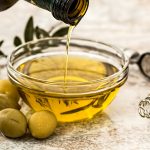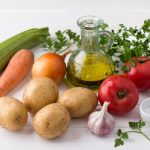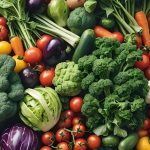I love pretty much anything with garlic in it… garlic stuffed olives, roasted garlic hummus, wild caught shrimp in an EVOO garlic sauce. It can even make foods I’m not very fond of taste good.
Spicing up my foods with garlic doesn’t just make them delicious. It makes them extremely healthy.
Plus, I like the history behind garlic.
In ancient Greece, it was fed to the original Olympic athletes to improve performance. In fact, it might have the first “performance enhancing” compound used in sports.
Back in the days of the Roman army, the chief medical authority recommended garlic for soldiers and sailors because it “cleans the arteries.”
The father of medicine, Hippocrates himself, prescribed garlic for parasites, respiratory problems, as a diuretic and as a cleansing agent. He clearly wasn’t joking around when he said “let your food be your medicine.”
Garlic was also used for a variety of ailments in ancient Egypt, China, Japan and India.
What is really interesting is all of these ancient cultures found similar results from garlic – improved stamina, strength, respiratory function, cardiovascular, gut health and more – even though they were completely isolated from each other.
Still, they weren’t wrong. Most health benefits of garlic have been validated by modern science, and everything we know says it is great for your health.
It’s antioxidant and anti-inflammatory action promotes good health. At the same time, it protects against things like cancer, high blood pressure, heart disease, diabetes and other serious health conditions.
But garlic isn’t the only stinky vegetable with amazing health benefits.
Garlic, Onions, Leeks and Shallots. Oh My!
Garlic gives you bad breath. Onions make you cry. And a lot of people don’t even know what a leek or shallot is.
These vegetables, collectively known as alliums, all contain high amounts of sulfur compounds that have a wonderful effect on your health. And seriously… who wouldn’t be willing to smell a little worse if it could potentially preserve your health and extend your life?
One of the greatest benefits these stinky vegetables have to offer is cancer protection. And they work on several fronts to do this.
- They appear to block the activation and formation of cancer-causing substances. In other words, they may halt the initiation of cancer.
- Many of the compounds in alliums have the ability to suppress the spread of cancer cells, and actually kill them off.
- The sulfur compounds in allium vegetables may enhance DNA repair capacity.
With all of these anti-cancer properties, it’s no wonder people who eat the most of them reduce their chances of several types of cancer. This includes cancers of the stomach, colon, prostate, breast, pancreas and esophagus.
Allium vegetables are also great for your cardiovascular health. Garlic, in particular, is something I recommend for all of my patients with – or at risk of – heart disease.
The active compounds in garlic help keep your blood cells from sticking together. This means improved blood flow and less chance of clotting. They also help to prevent oxidation of LDL cholesterol, lower blood pressure, reduce arterial plaque and protect against free radical damage. Incredible.
Adding other alliums like onions and leeks only helps matters.
In fact, higher intakes of garlic and onions are associated with about a 64% reduced risk of cardiovascular disease. Additionally, eating these foods can cut your chances of chronic kidney disease by almost a third. And they can reduce the onset of high blood pressure by around 25%.
Plus all of these foods help ward off osteoarthritis. They work by suppressing the production of something called metalloproteinases. These are enzymes that cause irreversible damage to bone, cartilage and other connective tissue. So the sooner you can stop the process, the more mobile you will remain.
Make Your Stinky Breath a Sign of Good Health
To get the most out of your alliums, it’s best to crush or chop them. This releases the sulfur compounds that are so good for you.
I advise my patients to eat two cloves of fresh garlic a day. Throw them into a smoothie or eat them with olives. Or, if you’re not a fan of working or eating garlic, you can take 600 mg of aged garlic extract twice a day.
Then, add chopped onion, garlic, leek, shallot, scallions and chives to your salads. Mix them in raw with your salad dressing. Use them as a starter for your favorite dishes by slowly sautéing them in extra virgin olive oil. Add them to soups, stews, sauces, marinades and anywhere else they make sense.
Every time you eat them, you have the potential to add years of healthy living to your life. So who cares if your breath smells? Just look at it as a sign of good health!
SOURCES:
Petrovska BB, Cekovska S. Extracts from the history and medical properties of garlic. Pharmacogn Rev. 2010;4(7):106-110.
Rivlin RS. Historical perspective on the use of garlic. J Nutr. 2001 Mar;131(3s):951S-4S.
Ansary J, Forbes-Hernández TY, Gil E, et al. Potential Health Benefit of Garlic Based on Human Intervention Studies: A Brief Overview. Antioxidants (Basel). 2020;9(7):619.
Nicastro HL, Ross SA, Milner JA. Garlic and onions: Their cancer prevention properties. Cancer Prev Res (Phila). 2015 Mar; 8(3): 181–189.
Garlic and Cancer Prevention. National Cancer Institute.
Ritchey JD, Huang WY, Chokkalingam AP, Gao YT, Deng J, Levine P, Stanczyk FZ, Hsing AW. Genetic variants of DNA repair genes and prostate cancer: a population-based study. Cancer Epidemiol Biomarkers Prev. 2005 Jul;14(7):1703-9.
Khatua TN, Adela R, Banerjee SK. Garlic and cardioprotection: insights into the molecular mechanisms. Can J Physiol Pharmacol. 2013 Jun;91(6):448-58.
Bahadoran Z, Mirmiran P, Momenan AA, Azizi F. Allium vegetable intakes and the incidence of cardiovascular disease, hypertension, chronic kidney disease, and type 2 diabetes in adults: a longitudinal follow-up study. J Hypertens. 2017 Sep;35(9):1909-1916. Wan Q, Li N, Du L, Zhao R, Yi M, Xu Q, Zhou Y. Allium vegetable consumption and health: An umbrella review of meta-analyses of multiple health outcomes. Food Sci Nutr. 2019 Jul 10;7(8):2451-2470.






